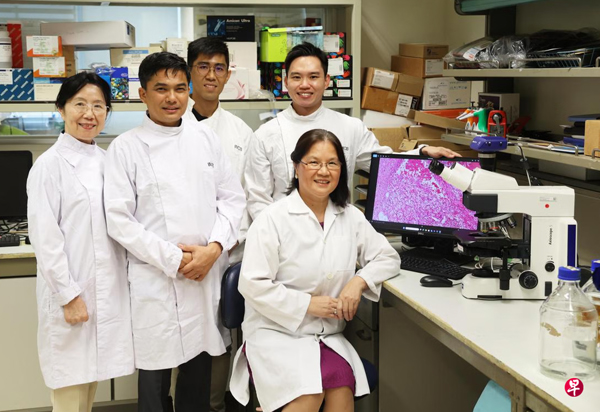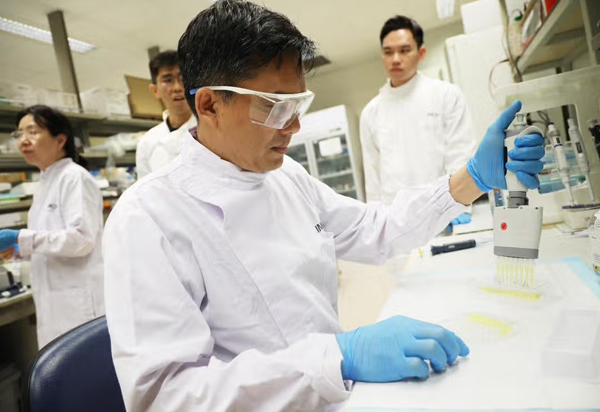
Prof Qi Zeng (front row) from the A*STAR Institute of Molecular and Cell Biology, together with her research team members Senior Scientist Ang Koon Hwee (standing, right), Research Officer Kuan Kam Yew, Senior Scientist Min Thura, and Senior Research Officer Li Jie, shares the latest development of the broad-spectrum anticancer drug PRL3-zumab with the media.
Phase II Trial Completed – Singapore’s New Anti-Cancer Drug One Step Away from Market
A locally developed broad-spectrum immunotherapy drug has passed Phase II clinical trials under the U.S. Food and Drug Administration (FDA), meaning it is now just one step away from reaching the market.
A broad-spectrum anti-cancer drug refers to a drug that may be effective against multiple different types of cancer.
Singapore Team’s New Anti-Cancer Drug Featured in Cell Reports Medicine
The new drug, PRL3-zumab, was developed by a team led by Professor Qi Zeng, Senior Principal Scientist at Singapore’s Agency for Science, Technology and Research (A*STAR) Institute of Molecular and Cell Biology (IMCB). The related research paper was published on May 8 in Cell Reports Medicine, a journal under the U.S.-based Cell Press.
In a recent interview with Lianhe Zaobao, Prof Zeng shared the research journey alongside four of her team members. She said, “This drug currently offers a new treatment option for patients with various types of advanced malignant cancers. I hope it can be used to save lives as soon as possible.”
The “PRL3” in the drug’s name refers to a protein that Qi Zeng discovered as early as 1998. This protein is uniquely found inside cancer cells, occupying just a billionth of the cell’s size, yet it could be the lethal target in many types of cancer.
PRL3-zumab Activates the Immune System to Precisely Target Cancer Cells with Remarkable Efficacy
The suffix “-zumab” indicates a genetically engineered antibody designed for safe use in humans. Once injected intravenously, this antibody can "summon" a large number of immune cells to attack a target protein, thereby working in concert to eliminate cancer cells. This approach is known as immunotherapy, which stimulates the body’s own immune system to fight cancer. According to Prof Qi Zeng and her team’s research, PRL3-zumab has demonstrated clear efficacy and good safety in patients with advanced-stage cancers.
As the saying goes, “It takes ten years to sharpen a sword”, but in Prof Zeng’s case, it took two decades. In the first ten years, she worked alongside over 4,000 preclinical models, repeatedly validating the drug’s efficacy. In the next ten years, she travelled across Singapore, Malaysia, China, and the United States to recruit more than 200 advanced cancer patients for Phase II clinical trials. As early as 1991, Prof Zeng had successfully bred Asia’s first transgenic rat for diabetes research. Leveraging her strength in animal model studies, she later redirected her focus toward cancer therapy.
“We developed multiple mouse models for lung, liver, stomach, kidney, and bone cancers, and conducted rigorous testing to ensure the drug's performance was fail-safe in animals before advancing to clinical trials,” she shared.

Senior Scientist Min Thura (wearing safety goggles) from A*STAR Institute of Molecular and Cell Biology conducts stability tests related to the drug PRL3-zumab.
PRL3-zumab Completes Overseas Phase II Trial, Eyes Fast-Track Approval for Market Launch
In 2016, PRL3-zumab received approval from Singapore’s Health Sciences Authority to initiate its Phase I clinical trial. Due to Singapore’s limited population, the Phase II trial was conducted overseas. According to the published study, 51 participants were enrolled across five independent cancer centers in the United States, with 20 patients providing data evaluable for clinical analysis. Among the 16 patients who received treatment, disease progression was slowed to varying degrees.
PRL3-zumab is currently being developed by Intra-ImmuSG (IISG), a biotech spin-off founded by Prof Qi Zeng in 2015 from A*STAR Institute of Molecular and Cell Biology (IMCB). She revealed that in 2018, the company secured a US$10 million (approximately S$13 million) angel investment from a local private firm, though additional funding is still needed to support future trials. Moving forward, IISG plans to engage with the U.S. Food and Drug Administration (FDA) to explore the possibility of applying for a “Fast Track” designation under the breakthrough therapy pathway.
Encouraging Results, But Too Early to Draw Conclusions, Says Local Oncologist
While the preliminary results are promising, local oncologist Dr. Poon Yew Hee, Donald cautioned in an interview that it is still too early to draw definitive conclusions about the efficacy of PRL3-zumab.
He said, “Over the past 10 to 15 years, there have been significant technological advances in the treatment of late-stage cancers. In addition to chemotherapy, immunotherapy and precision-targeted therapies are now commonly used in clinical trials.”
However, he also noted that all treatment strategies may come with side effects. For instance, chemotherapy can cause fatigue and reduced blood cell counts, targeted therapy often leads to skin rashes, and immunotherapy may trigger inflammatory responses in various organs.



.png?sfvrsn=c3edc68e_6)